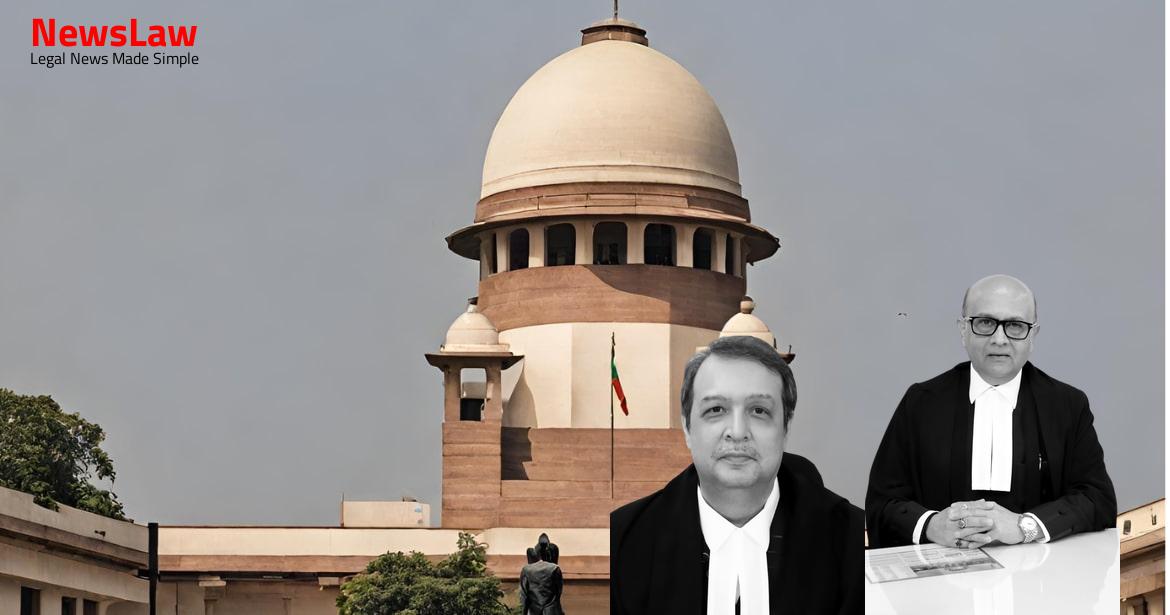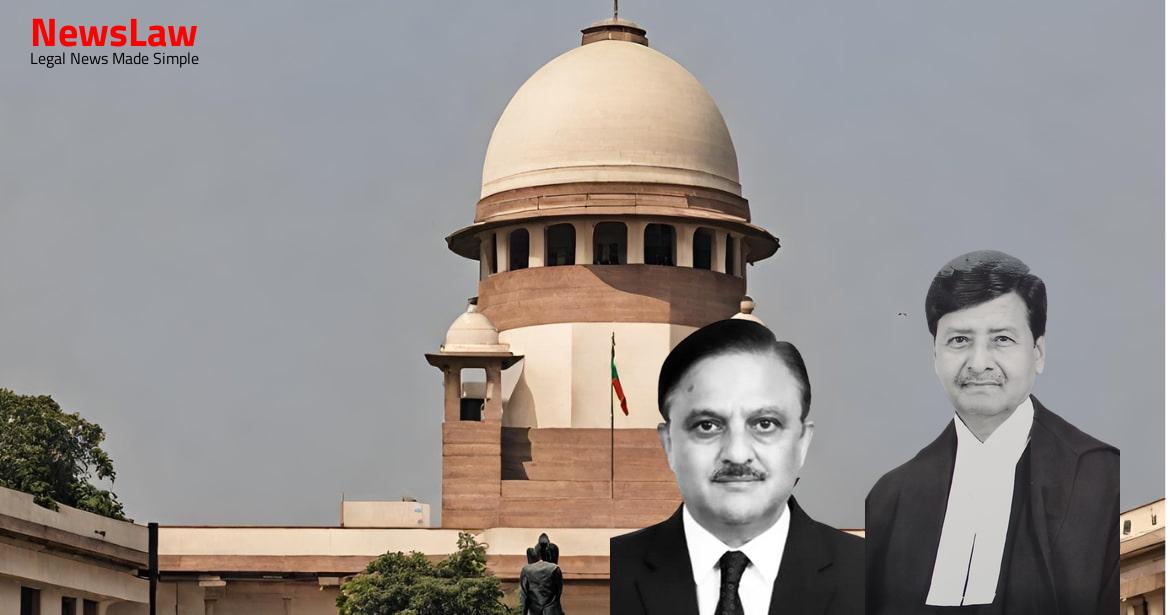Introduction
Delve into the complex legal analysis behind the recall of a resolution plan approval, shedding light on the court’s examination of procedural errors and jurisdictional aspects. This summary brings insight into the nuances of the case, emphasizing the importance of due process and fairness in insolvency resolution matters.
Facts
- The appellant submitted a claim for unpaid instalments towards the premium for the lease in January 2020.
- The NCLT rejected the claim on the grounds of delay in taking action against the RP and completeness of the CIRP after plan approval.
- The appellant filed an appeal which was dismissed citing lack of diligence in pursuing rights post approval of the plan.
- RP treated the appellant as an operational creditor despite being claimed as a financial creditor.
- The appellant challenged the RP’s decision and the approval of the resolution plan through multiple applications filed at different times.
- The appellant argued errors in being classified as an operational creditor, lack of priority as a secured creditor, and lack of hearing before approval of the plan.
- The NCLAT found the approval of the resolution plan invalid due to the absence of the appellant in the COC.
- The appeals are directed against the NCLT’s order which dismissed appellant’s applications under Section 60(5) of the IBC.
- The appellant claimed to be a financial creditor and owner of the land with statutory rights over CD’s assets, seeking priority and adequate allocation in the resolution plan.
- Claims were invited through a public announcement after default by the CD in payment of instalments.
- The appellant’s various applications, challenges, and claims were addressed during the legal proceedings.
Also Read: https://newslaw.in/supreme-court/judgment-recall-and-legal-analysis/
Issue
- The application for recall of the order was not barred by time
- The resolution plan put forth by the resolution applicant did not meet the requirements of sub-section (2) of Section 30 of the IBC read with Regulations 37 and 38 of the CIRP Regulations, 2016
Arguments
- The appellant submitted its claim with proof as a financial creditor with security interest over the assets of the Corporate Debtor on 30.01.2020.
- Even if the appellant was not recognized as a financial creditor, the resolution plan should have acknowledged its claim as a secured creditor.
- The order of approval dated 4.8.2020 incorrectly described the appellant as one who did not submit its claim, which was disputed.
- The meetings of the Committee of Creditors (COC) were not notified to the appellant for participation, leading to a lack of opportunity for involvement.
- The absence of notification to the appellant regarding COC meetings raises concerns about the validity of the resolution plan.
- During the approval of the resolution plan, the adjudicating authority failed to consider the provisions made for the appellant’s claim, the statutory charge it held over the CD’s assets, and the appellant’s ownership and statutory rights over the land.
- The overlooking of the appellant’s rights and interests raised questions about the feasibility and viability of the approved resolution plan.
- The commercial wisdom of the COC is not justiciable.
- Once the resolution plan is approved by the Adjudicating Authority, it cannot be questioned through a recall application.
- The appellant failed to demonstrate how they could be considered a financial creditor.
- The appellant’s challenge to the approval of the resolution plan is found to be without merit due to their status.
- The dues payable to an Industrial Area Development Authority are not classified as financial debt.
- The appellant had no voting rights in the COC as they were not a financial creditor.
- The appellant’s challenge to the order of approval is deemed to have no basis.
- The argument that the appellant is a financial creditor was not considered as per the decision in Anand Sonbhadra (supra).
Also Read: https://newslaw.in/case-type/civil/courts-analysis-on-compliance-with-resolution-plan-conditions/
Analysis
- The Recall Application was found to be maintainable despite an appeal lying before the NCLAT.
- The Recall Application was not barred by time.
- The Form in which a claim is submitted is considered directory, not mandatory.
- The RP has various duties to perform under the IBC, including maintaining an updated list of claims and convening COC meetings.
- Claims submitted must be supported with proof.
- An application for recall of an order is maintainable on limited grounds.
- The resolution plan did not meet the requirements of Section 30(2) of the IBC read with Regulations 37 and 38 of the CIRP Regulations, 2016.
- The resolution plan failed to acknowledge the appellant’s claim and mentioned incorrect figures of the amount due.
- The delay in pursuing remedies was found to be misconceived.
- The recall application was not barred by time as timely filed.
- The I.A. No.344/ 2021 and I.A. No.1380/ 2021 were promptly filed by the appellant upon receiving information about the plan approval.
- A tribunal or court may recall an order if the proceedings lack jurisdiction, involve fraud, mistake prejudicing a party, or were rendered in ignorance of a necessary party.
- Ancillary powers are invested in a tribunal or court to do justice between parties and recall orders in absence of statutory prohibition.
- The power to recall an order can be exercised in cases of procedural error or inherent lack of jurisdiction to prevent abuse of the court’s process.
- Inherent power to recall orders is preserved by Rule 11 of the NCLT Rules, 2016.
- Recall of judgment can be based on procedural errors like lack of serving necessary parties or fraud played on the court.
- Distinction between procedural review and review on merits is recognized in the context of recalling orders to prevent abuse of the court’s process.
- Section 408 of the Companies Act establishes the National Company Law Tribunal (NCLT) with a President and members appointed by the Central Government.
- NCLT is empowered to exercise powers under the Companies Act and other laws as specified by the Central Government.
- Rule 11 of the NCLT Rules, 2016, and Section 151 of the Code of Civil Procedure, 1908, safeguard the inherent powers of the Tribunal for the sake of justice and to prevent abuse of process.
- Section 60(5) grants NCLT jurisdiction over applications, claims, and issues related to insolvency resolution or liquidation of corporate debtors.
- The NCLT was constituted by the Central Government under Section 408 of the Companies Act, 2013.
- NCLT and NCLAT did not consider crucial aspects while deciding the application/appeal of the appellant.
- The appellant was not served notice of the meeting of the COC, rendering the proceedings up to the approval of the resolution plan as ex parte to the appellant.
- Despite being a secured creditor by operation of law, the resolution plan portrayed the appellant as not having submitted its claim.
Decision
- The resolution plan did not meet all parameters laid down in sub-section (2) of Section 30 of the IBC read with Regulations 37 and 38 of the CIRP Regulations, 2016.
- The appeals of the appellant are allowed and the impugned order dated 24.11.2022 is set aside.
- The order dated 04.08.2020 passed by the NCLT approving the resolution plan is set aside.
- The resolution plan is to be sent back to the COC for re-submission after satisfying the parameters set out by the Code.
- There shall be no order as to costs.
Case Title: GREATER NOIDA INDUSTRIAL DEVELOPMENT AUTHORITY Vs. PRABHJIT SINGH SONI (2024 INSC 102)
Case Number: C.A. No.-007590-007591 / 2023



